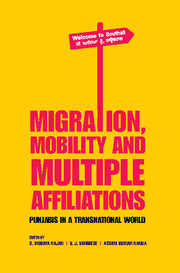Book contents
- Frontmatter
- Contents
- List of Tables and Figures
- Preface
- Acknowledgements
- Transnational World and Indian Punjab: Contemporary Issues
- Part I A Historical Survey
- Part II Shifting Contours of Migration
- Part III Social Structures and Organizational Links
- Part IV Education and Migration
- Part V Family Networks
- 13 Punjabis in Italy: The Role of Ethnic and Family Networks in Immigration and Economic Integration
- 14 Gender, the Life Course and Home Making across Tanzania, Britain and Indian Punjab
- 15 Inter-generational Tensions and Cultural Reproduction in a Punjabi Community in England
- Contributors
- Index
15 - Inter-generational Tensions and Cultural Reproduction in a Punjabi Community in England
from Part V - Family Networks
Published online by Cambridge University Press: 05 March 2016
- Frontmatter
- Contents
- List of Tables and Figures
- Preface
- Acknowledgements
- Transnational World and Indian Punjab: Contemporary Issues
- Part I A Historical Survey
- Part II Shifting Contours of Migration
- Part III Social Structures and Organizational Links
- Part IV Education and Migration
- Part V Family Networks
- 13 Punjabis in Italy: The Role of Ethnic and Family Networks in Immigration and Economic Integration
- 14 Gender, the Life Course and Home Making across Tanzania, Britain and Indian Punjab
- 15 Inter-generational Tensions and Cultural Reproduction in a Punjabi Community in England
- Contributors
- Index
Summary
Introduction
The aim of this chapter is to highlight an aspect of diasporic Punjabi identity based upon the family life course approach. Focusing upon the life course of some 40 women in a small English town of Hitchin, the chapter contributes towards understanding the process of identity formation, its reproduction through two generations of Punjabi women and their families, showing the process whereby it is moderated by active agents of such cultural reproduction – the women. This chapter tries to delineate the changes among migrant women's social identity especially concentrating on their experience of the pre and post-married lives. The interviews were conducted with Sikh women in Hitchin during 2004. Women represented two generations, the older group was born in India and the younger born and socialized in England.
The chapter is based on exploratory research including participant observation, informal conversation and in-depth interviews drawn from snowball technique of contacting respondents. Due to snowball technique, most of the author's respondents turned out to be Jat Sikhs. Although the gurdwara was the first site to get connected to the community, later snowball technique was used to locate respondents outside the temple. Most of the interviews were conducted in the living rooms of the respondents or their friends’ or in the gurdwara and one interview was conducted in a coffee shop.
The family life course approach is theoretically meaningful for the study of cultural reproduction and identity formation in the diasporic situation because it is uniquely able to address the impact of migration over time and over multiple generations. Stages of the life course reflect the ageing of these women, which is associated with different kind of needs during their pre and post-married lives. Highlighting significance of the location, the present research represents variations in individual preferences to identify with ‘in group’ or ‘out group’ across the life span, particularly in the pre and post-marital stages of second generation women. For the purpose of the present chapter ‘in group’ is the Punjabi Sikh Community and ‘out group’ consists of those perceived as being outside that community by the respondents.
Theoretical considerations
Cultural practices of Sikhs in Britain have been discussed by Singh and Tatla (2006) Bhachu (1989) Rait (2005) Ballard (1978) and Jones (1980).
- Type
- Chapter
- Information
- Migration, Mobility and Multiple AffiliationsPunjabis in a Transnational World, pp. 360 - 374Publisher: Cambridge University PressPrint publication year: 2015
- 2
- Cited by



